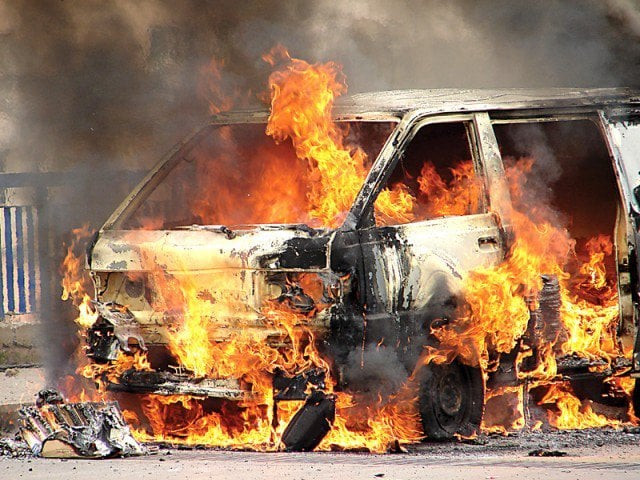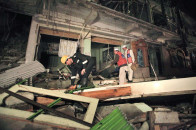Authorities set up testing workshops at CNG stations
Owing to poorly-fitted cylinders, catastrophic fuel tank ruptures and explosions frequently occur across Pakistan

PHOTO: FILE
The move is aimed at monitoring and stopping leakage of gases from public transport and cars that often cause explosions, resulting in property damage as well as a loss of lives. Per sources, workshops have been set up at 31 CNG stations and the number is likely to be increased to 100 by the end of November.
Despite the ban on the use of liquefied petroleum gas (LPG) as fuel in public transport across Pakistan, the consumption illegally continues resulting in untoward incidents.
SHC takes notice of use of substandard gas cylinders
In the past, petrol was the most-widely consumed fuel in Pakistan for decades. CNG was introduced as a cheap alternative in the 1990s and was widely welcomed by the public. Experts say that CNG tank explosions are not
likely but the substandard quality of cylinders results in leakages, which, in turn, cause explosions.
Speaking to The Express Tribune, APCNGA Chairman Ghiasuddin Paracha said that no CNG cylinder has ever exploded in a vehicle.
“CNG is lighter than air and owing to the higher pressure of the emitting gases, the gas rises and sets ablaze but a cylinder does not explode,” he said.
He added that owing to the ban on CNG for the past few months, many stations have been closed because of which people are struggling to get their CNG kits fixed. As a result, vehicles that were equipped with cylinders have begun using LPG, which increases the risk. At present, no governmental authority has compiled details about gas cylinderrelated explosions in passenger vehicles and the losses resulting from them.
According to the record available with emergency helpline services, however, several explosions were reported from Sept 2018 to Sept 2019. Details revealed that 9,069 explosions were caused by gas leaking from LPG cylinders, while 1,033 incidents occurred after substandard CNG cylinders burst to cause a fire.
Per the data, throughout the year, 79 people lost their lives in car explosionrelated incidents, while some 523 people, who suffered injuries, were shifted to hospitals.
Eight injured as cylinder explodes
Moreover, a total of 5,219 incidents took place in commercial areas, 5,490 in residential areas and 8,508 occurred at thoroughfares and several other locations. Ghiasuddin Paracha shared that owing to the increasing number of incidents, the APCNGA has decided to set up a workshop at CNG stations across the country for testing the gas kit.
“Although a number of workshops have already been set up, approval from the Hydro-Carbon Development Institute Pakistan (HDIP) for the workshops is currently being sought,” he said.
Faisal Khan, a bus driver with a CNG cylinder installed in his vehicle, shared that two cylinders are installed with CNG kit in the vehicle, in which 10-kilogram of gas can be filled.
“While a distance of six kilometres can be covered with one litre of petrol, an equal amount of CNG can help cover a distance of 10km, thus, it financially benefits the vehicle owner and is a preferred choice,” he said, adding that as a precautionary measure, passengers are prohibited from smoking since gas leakage can ignite fire.
“A lot of untoward incidents take place from cylinder-related explosions, therefore, the government should ensure that every CNG-powered vehicle undergoes a check every six months along with a clearance certificate,” he said.
When approached, several mechanics working at Multan Road Lahore, who are experts in fitting gas cylinders in cars at minimal rates, informed that many vehicle owners are largely unaware about poorly-fitted or substandard cylinders, because of which leakages happen.
“If explosions occur, both the vehicle owner and the mechanic who fits the cylinder in a car are equally responsible because they are putting precious lives at stake for saving a few thousand rupees,” the driver said. According to the Punjab government, the HIDP should set up workshops in every district so that the quality of the cylinders and gas kits could be checked in public service vehicles (PSVs). Such workshops are inoperative and there is a lack of desired expertise, which adds to untoward incidents.



















COMMENTS
Comments are moderated and generally will be posted if they are on-topic and not abusive.
For more information, please see our Comments FAQ